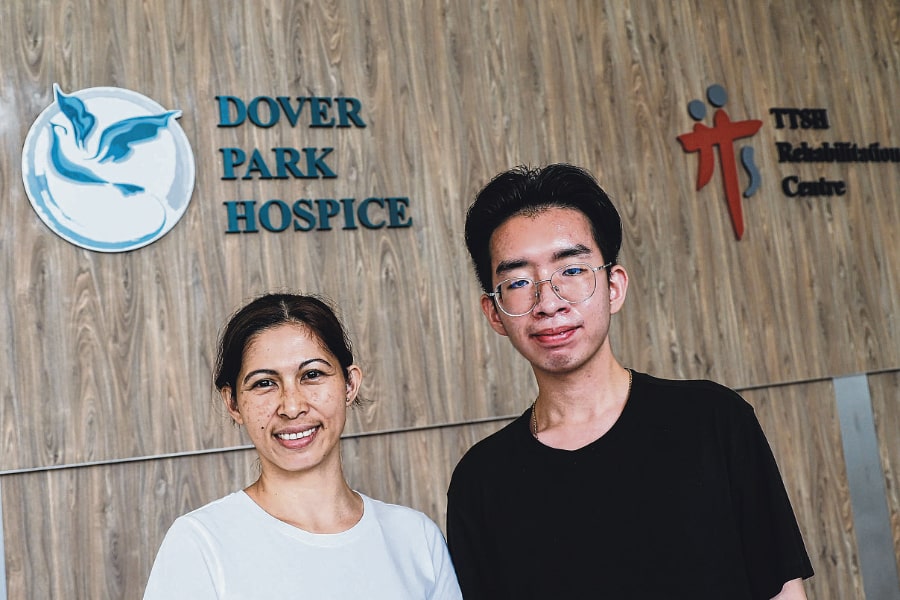 Ms Ike Handayani, a domestic helper from Indonesia, and Mr Tan Pui Lok, a third-year nursing student at Ngee Ann Polytechnic, are volunteers under Tan Tock Seng Hospital’s Integrated Care Hub’s Para-Nursing Volunteer Programme. PHOTO: LIANHE ZAOBAO
Ms Ike Handayani, a domestic helper from Indonesia, and Mr Tan Pui Lok, a third-year nursing student at Ngee Ann Polytechnic, are volunteers under Tan Tock Seng Hospital’s Integrated Care Hub’s Para-Nursing Volunteer Programme. PHOTO: LIANHE ZAOBAO
The Straits Times (29 April 2024)
They join over 90 current volunteers to work with nurses to care for patients
Ms Ike Handayani has only one day off a week, and she spends it taking care of elderly patients – whom she affectionately calls “Ah Ma” and “Ah Gong” – at Tan Tock Seng Hospital’s Integrated Care Hub (TTSH-ICH).
The 38-year-old domestic helper from Indonesia said that when she is caring for the elderly, she feels as though she is caring for her parents, who are in their 70s, and that the patients treat her like their daughter or granddaughter.
She is a volunteer under TTSHICH’s Para-Nursing Volunteer Programme, and had chanced upon the programme online and joined to “deepen her knowledge” on caregiving.
She is among the more than 90 regular volunteers – aged 18 to 45, and including nursing students, domestic helpers and housewives – who have joined the programme, which was rolled out in December 2023 with an initial group of 14.
On April 28, the programme was slated to welcome 30 more volunteers, said senior nurse manager K. Patmawali, paranursing volunteer lead and one of the programme’s initiators.
According to TTSH, it is the only hospital here with a para-nursing volunteer programme, where non-professional volunteers work with nurses to provide care for patients, allowing nurses to focus on higher-risk activities such as providing medication and invasive procedures.
Unlike other volunteer programmes, this initiative equips volunteers with caregiving skills through on-the-job training with their nurse buddies and training that is specific to the programme.
For example, volunteers are taught how to turn a patient on a bed safely and how to help a patient shower.
They also befriend patients and assist them in changing their diapers, using the toilet, taking walks and having meals, among other things.
Throughout the sessions, volunteers are supervised by their nurse buddies.
The programme currently serves seven wards in the ICH, which focuses on rehabilitating patients and reintegrating them into the community.
Amid the hectic schedules of shared wards, said senior staff nurse Nur Alif Sharif, the programme lightens the workload of workers and increases efficiency.
Sometimes, when patients call for assistance while the nurses are serving medication to others, the volunteers can check on them, he said.
“If they ask for something minimal, like getting a drink, the volunteer can get it for the patient. So at least it will help me to focus on what I am doing.”
Madam Patmawali agreed that the nurses are usually kept busy. “I can see (the nurses) don’t even go to the toilet sometimes. Some of them don’t even go for their break.”
Having the volunteers also improves the patients’ experience, said Mr Alif.
“Sometimes, we are so busy with work, we don’t have time to have conversations. With the volunteers befriending and talking to the patients, they feel happier. Sometimes, they’ll even ask us the next day if the volunteer is coming.”
Madam Patmawali said that on average, about four volunteers come on a weekday, with more coming on weekends to help out.
The hospital hopes to expand the programme’s scope to its main wards and teach volunteers higher-level skills, such as feeding patients through a tube that carries food and medicine to the stomach through the nose.
Later in 2024, more experienced volunteers will be trained in urine catheter care, said Madam Patmawali.
Another regular volunteer is Mr Tan Pui Lok, 20, a third-year nursing student at Ngee Ann Polytechnic.
Mr Tan, who has been volunteering at the ICH since December, said he decided to do so as it provides him with more opportunities to interact with patients.
Clinical attachments that his school facilitates focus more on hard skills, such as how to manage a bone fracture, but less on talking with patients, he said.
“By volunteering, it gives me more opportunities to hone my soft skills, for example, communication.”
Mr Tan found out about the programme through a staff member at his school, who suggested that he gain more exposure and learn more medical conditions through volunteering.
He said some of his lecturers said it is good that he volunteers, but reminded him to “find a good balance between studying and volunteering”.
“I hope to promote volunteerism among youth, where youth of different expertise could make an impact on our society, making Singapore a better place to live in,” he added.
To join the Para-Nursing Volunteer Programme, applicants have to be above 16 years old and go through an interview process and training programme.
For more information on TTSH’s volunteer programmes, visit its website.